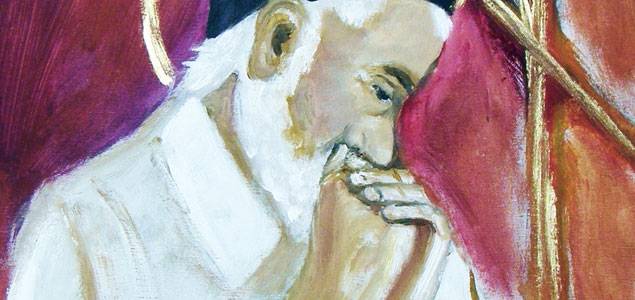What sicknesses did St. Vincent suffer in old age?
 Probably many of us spontaneously think of St. Vincent dePaul in his prime. Probably few of us think of the young Vincent before his mid-life conversion to the those who were on the margins and abandoned. Maybe even fewer think of Vincent suffering any illness. Former Superior General Robert Maloney helps us with the latter in a few short paragraphs describing what Vincent suffered in an article on caring for elderly confreres…
Probably many of us spontaneously think of St. Vincent dePaul in his prime. Probably few of us think of the young Vincent before his mid-life conversion to the those who were on the margins and abandoned. Maybe even fewer think of Vincent suffering any illness. Former Superior General Robert Maloney helps us with the latter in a few short paragraphs describing what Vincent suffered in an article on caring for elderly confreres…
St. Vincent lived 30 years beyond the median age of his contemporaries. Given that fact, one might presume that he had a rather robust constitution, even though we know from his own statements that he suffered from a variety of illnesses. Struck by an arrow at the age of 25, he would feel its effects for the rest of his life.
He frequently suffered from fevers and a type of malaria, which he called his “little fever,” and for which Louise de Marillac tenderly described many remedies.
As early as 1615, his legs began to give him trouble. By 1632, he had to buy a horse in order to travel from St. Lazare into Paris each day. In 1633, a horse fell beneath him and then on top of him. However, he was tireless and, in an age when transportation was limited, was capable of covering hundreds of miles in very little time. In the first half of 1649, when he was almost 70 years of age, he traveled by horse through 600 km of western France.
But by June of 1649 he could no longer mount the horse, so, with considerable embarrassment, he began to use the carriage that the Duchess of Aiguillon gave him. He also had been kicked by a horse in 1631, thrown from one in 1633, and fell into the Loire at Durtal in 1649. That same year, he just missed being assassinated. The swelling in his legs reached his knees in 1655, so that he could no longer genuflect and had to take to using a cane. He had a serious carriage accident in 1658. That same year, the ulcers in his right leg produced a gaping wound on the ankle. He also experienced considerable difficulty with one of his eyes. From 1659 on, he was not longer able to leave St. Lazare and within a few months he had to remain upstairs and celebrate Mass in the infirmary. Soon after that, he could no longer celebrate by himself and had to use crutches to move around. Six weeks before his death, these became useless to him and he had to accept assisting at Mass from a chair.
As early as 1644, serious illnesses began their offensive; these succeeded in keeping him in bed for periods of eight to ten days. They repeated their assaults in 1649, 1651, 1652, and 1655.
To all these maladies were added, in 1659, further problems caused by kidney stones and retention of urine. To move he had to use a rope which had been tied to a joist in his room.
St. Vincent also had the painful experience, in his declining years, of seeing his closest friends die. He was able to be present at the deathbed of Jean-Jacques Olier, who went to the Lord on Easter Sunday in 1657. “The earth possesses his body, the heavens his soul, but his spirit remains with you,” St. Vincent told Olier’s followers that day. On December 31, 1659 Alain de Solminihac, his great friend and fellow reformer of the clergy, also died. The final year of St. Vincent’s life, 1660, was marked by the death of three of his closest companions. Monsieur Portail, friend and collaborator for almost 50 years, died on February 14. On the morning of March 15 Louise de Marillac went to the Lord. “You have in heaven a mother who has much influence,” he told the Daughters of Charity. On May 3 Louis de Chandenier, for whom St. Vincent had the greatest admiration and affection, also died. Vincent burst into tears on hearing the news.
All of these deaths touched the saint deeply. Even as early as January 1659 he began to say goodbye to his friends. In a letter written at that time, after begging pardon for his faults, he told the former General of the Galleys, Philippe-Emmanuel de Gondi, that he would pray for him in this world and in the next.
From “On Selling the Chalices” by Robert Maloney, CM






0 Comments